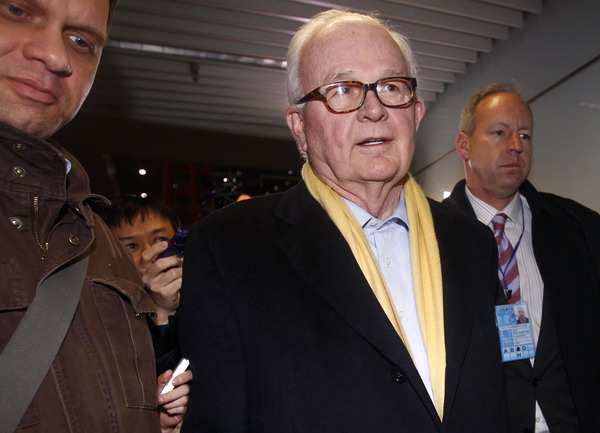he US envoy for policy on the Democratic People's Republic of Korea (DPRK) arrived in Beijing on Wednesday as part of a flurry of diplomatic activity to defuse tensions on the Korean Peninsula.

Stephen Bosworth met Republic of Korea (ROK) officials in Seoul before heading to China. He is expected to meet with China's top nuclear negotiator Wu Dawei on Thursday and wrap up his Asian tour with a visit to Tokyo the same day.
While in Seoul, he expressed hopes that serious negotiations on the DPRK will start soon, AP reported. He didn't elaborate and it wasn't clear if he was referring to the stalled Six-Party Talks on nuclear disarmament or something else.
He said he would continue to coordinate closely with China.
Tension on the Korean Peninsula has spiked to some of its highest levels since the 1950-53 Korean War after an exchange of artillery fire between the two Koreas in November and threats of war.
In Washington, Foreign Minister Yang Jiechi discussed the situation on the Korean Peninsula with US National Security Adviser Tom Donilon in a White House meeting on Tuesday.
"They talked about ways to persuade Pyongyang to abandon its nuclear weapons program ... and avoid destabilizing behavior," Reuters reported, quoting a White House statement.
Yang also met US President Barack Obama to discuss bilateral relations and an upcoming state visit to the United States by President Hu Jintao later this month.
Obama said he "looked forward to the visit of President Hu and to the US and China working together effectively to address global challenges", the White House statement said.
Yang also met US Secretary of State Hillary Clinton on Wednesday.
China and the US must get parties back to talks and present ways to soothe tension, Seoul's JoongAng Daily said.
"A war in the region would be catastrophic for not only the two Koreas, but ... the US and China," it said in an editorial.
In Seoul, Bosworth met the ROK foreign minister. Bosworth does not appear to be in the region to unveil a US proposal to get the DPRK back to negotiations, but said he is collecting views from all sides.
Speaking after his meeting with Bosworth, Kim Sung-hwan, the ROK foreign minister, sounded a cautious note about whether the Six-Party Talks could restart, calling them a "useful negotiating tool".
Earlier, Kim said that the ROK, the US and Japan had already agreed on what the DPRK needs to do for the multilateral talks to resume.
"But the right conditions, including North-South dialogue are needed for there to be real progress," Kim was quoted as saying by the Yonhap news agency on Wednesday.
"It depends on the North's behavior, whether it will choose a path of conflict or peace."
Pyongyang has expressed its keenness to return to the negotiating table.
The DPRK called on Wednesday for "unconditional and early" talks with the ROK to put an end to months of tensions.
Its official Rodong Sinmun newspaper also said on Wednesday that "the Korean nation should defuse the confrontation between the North and the South at an early date".
Relations between the North and South could not improve "as long as the said relations remain in the state of confrontation and on the brink of war without dialogue, contact and cooperation", it said.
In recent days, all sides have suggested they are willing to restart the Six-Party Talks, which collapsed more than two years ago.
Scott Snyder, a US expert on Korean affairs with the Asia Foundation, said Bosworth is consulting with other parties in the context of the Sino-US discussions that will occur in the run-up to Hu's visit to Washington.
"I think the hope is that strengthened Sino-US consultations can serve to cap any potential escalation in inter-Korean relations, since initial consultations already appear to have had such an effect," he told China Daily.
Huang Youfu, director of the Institute of Korean Studies at Minzu University of China, said "the dawn of the Six-Party Talks" is back and China's continuous diplomatic efforts were showing effects.
"Tension is easing since both the DPRK and ROK realized military action cannot solve any problem, and both have sent positive signals about talks," Huang noted.
Zhang Liangui, an expert on Korean affairs at the Central Party School, also expressed cautious optimism over the resumption of the Six-Party Talks.
"Bosworth's visit focuses on tension reduction and denuclearization through negotiations and upon the efforts of the relevant parties. I think there is little obstacle to restart the Six-Party Talks," he said.